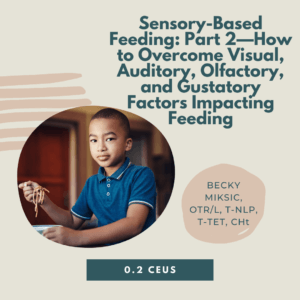This 4-hour course explores the typical development of self-regulation and executive functioning, functional use of each skill area within daily routine tasks, and over 100 different play-based treatment ideas to build self-regulation and executive functioning skills. Self-regulation areas of focus include parent education, exploration of self-regulation programs, and teaching self-regulation strategies. Executive function areas explored include situational awareness, temporal spatial capacity/window, nonverbal working memory, if . . . then conditional thinking, time awareness, inhibition/impulse control, self-monitoring, emotional control, initiation, shifting attention, working memory, planning/organizing, task monitoring, organization of materials, problem solving, and attention (with focus on divided attention and sustained attention). Parent handouts for each skill area are included to increase knowledge about using each area throughout our daily functional routine to increase organic practice opportunities for children! The course is included with The OT Treatment Interventions webinar package.
Emily Bourque, MS, OTR/L, graduated from the University of New Hampshire with her master’s degree in 2016. She grew up with a younger sister who has Down syndrome. Attending IEP meetings and advocating for her sister molded her occupational therapist’s mindset long before graduation.
Emily participated in the Leadership in Neurodevelopmental Disabilities program in her final year of college, where she worked on projects with the Parent Information Center of New Hampshire, New Hampshire Family Voices, and the Institute of Disability at the University of New Hampshire. She has volunteered for many special needs organizations including Special Olympics, the local recreation department, and various therapeutic riding centers.
Emily has worked in a variety of settings including skilled nursing, inpatient rehabilitation, schools, early intervention, and outpatient pediatrics. She has created resources and interactive activities for her clients and collaborated with local optometrists to implement a pediatric vision program. In addition, she is an adjunct faculty member at the University of New Hampshire OT department, teaching for three years nonconsecutively. She coordinates a life skills group for young adults with disabilities.
Emily enjoys laughing with her patients and most of all seeing their continued progress. She strongly believes that parent education and collaboration are paramount to successful OT services. She believes in inclusion for individuals with disabilities.




© Sensational Brain 2022 – All rights reserved
This site is protected by reCAPTCHA and the Google Privacy Policy and Terms of Service apply.